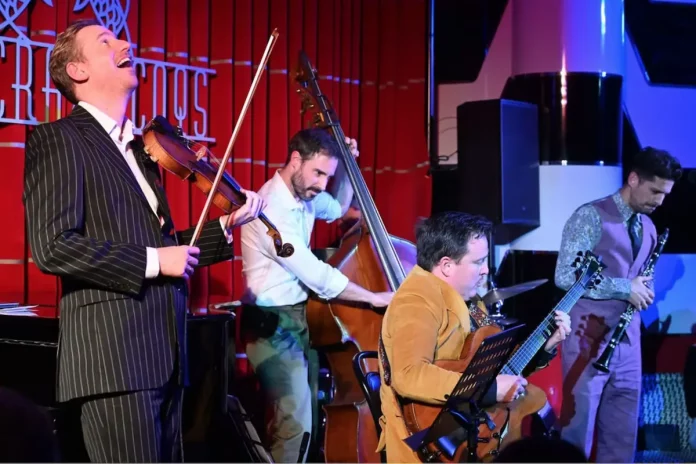The Hot Club of Jupiter: Copacallisto
An accomplished and popular band on the swing/dance circuit, violinist Kit Massey’s Hot Club of Jupiter launched this new album at London’s Crazy Coqs in late October. The music on it shows they’re not just a Reinhardt-Grappelli tribute band, although some tracks, such as Craven Street Pit Blues and Hot Heat, are straight out of that lineage. Their repertoire is wider, as you might expect given the presence of versatile guitarist Sam Dunn, who not only accurately conveys the Parisian feel, but also gives a glimpse of western swing on Gammy Kneed. Those familiar with his work with Dave O’Higgins, Simon Spillett and others will recognise a touch of Grant Green in the more modern Destination Moon, Jon Shenoy’s bass clarinet in close attendance and Massey on piano.
The addition of Mike Guy’s accordion on four of the numbers gives an added dimension, particularly through the adept changes of Balthazar And Nerris, on Le Château De Monfréville (played as a luscious tango and no doubt recalling a visit to the area of Normandy west of Bayeux) and the delightful Valse Macabre No.2.
The vocal tracks have a quirkiness that reminds me of the late Neil Innes: there’s a degree of satirical curiosity about them. Riches, status and cocktails are features of The Count Of Monte Carlo; the heady world of high finance figures in Destination Moon. Shenoy’s Ballad For Laika, a song of lost love, has the clue at the end – “lost in outer space” – clearly a reference to the Soviet dog, who went from the humble streets of Moscow to space-travel immortality.
Jon Batiste: Lonely Avenue (Verve/Interscope 00602478494178)
If anyone wants to hear an album that incorporates a wide range of styles, look no further. Unclassifiable, it draws on strands associated with Batiste’s Louisiana origins, country blues, soul and gospel, and modern R&B. The instrumentation varies in size, according to the various stylistic compositions.
Lean On My Love is a smoothly produced piece that brings to mind the Womacks and Prince, whilst Do It All Again is a soulful, gospel-tinged love song, with strong piano work. Petrichor, the scent of rain on dry earth, references pollution and the environment, a strong element of Batiste’s activism.
The compositions are by Batiste himself, but there’s a great version of Lonely Avenue, a hit for Ray Charles back in the 50s and written by Doc Pomus, whose collaboration with Mort Shuman produced innumerable hits over the years. Here, Batiste duets with veteran singer/songwriter Randy Newman in one of the highlights of the album.
There’s a strong flavour of New Orleans on Pinnacle, with downhome country guitar picking, in contrast to the mesmeric and heartfelt At All and Maybe (Batiste’s solo piano accompanying his vocals) and the rock-steady Angels. Strictly speaking, it’s outside the parameters of jazz, but it’s interesting, enjoyable and diverse.
Ivo Perelman & Matthew Shipp String Trio: Armageddon Flower (Tao Forms TAO18)
The two albums above include vocal critiques of topical issues, as satire or social comment, and this is approached on a musical level on Armageddon Flower, a response to the incessant wars, climate change and self-destruction prevalent in our world. The result is music that can be harsh, fractured and discordant. It can also settle into passages of calm optimism. The title itself refers to the possibility of life after the ultimate destruction, its gradual resurrection and hope of salvation implied in the track Restoration.
The rapport within the group is evident, understandable after years of collaboration which began when the musicians were part of New York’s Lower East Side improvising fraternity. The String Trio of pianist Matthew Shipp, violist Mat Maneri and bassist William Parker is well-established and has close connections with saxophonist Ivo Perelman, individually and as a unit. A bonding and chemistry has developed that eases the facility of spontaneous interaction, an intuitive exchange of ideas.
There are sections of duo and trio playing, but it’s essentially group music, a conversation in which any dominant voice is incorporated into the collective. The four pieces vary in length, depending on how the music evolves as it ebbs and flows; dark chasmic depths and turbulence occasionally open into positive moments of resolution. Perelman’s horn and Maneri’s viola often seem to take the initiative, at times mimicking each other in high levels of pitch, whilst there’s a formality to Shipp’s piano as the wandering pulse of Parker’s bass gives security, but all of this can suddenly change as roles reverse and fluctuate.
In some respects it’s like looking at a huge Rothko painting, in which the intensity of paint alters the consciousness of the viewer; the listener can become engrossed in the sound, descend into an abyss or arise from the turmoil with renewed conviction or even assurance. Perelman has compared the music to reading the Book of Revelations, the parallel of impending doom and apocalyptic events, but whilst the writer (John of Patmos) interpreted it in terms of the second coming of Christ, here the vision of a new age comes through the blossoming of an Armageddon Flower. Given the present state of things, good luck to that.

